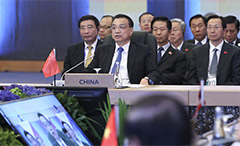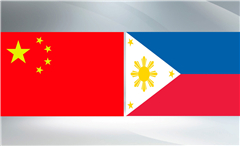ASEAN to negotiate South China Sea code of conduct
2017-11-14
China Daily
China and member countries of the Association of Southeast Asian Nations said on Nov 13 they would begin talks on details of a code of conduct in the South China Sea.
Premier Li Keqiang made the proposal at the 20th China-ASEAN (10+1) leaders’ meeting in Manila on Nov 13, the Foreign Ministry said.
Late on Nov 13, Philippine President Rodrigo Duterte, ASEAN’s rotating chairman this year, said the organization agreed to start the talks on the code of conduct, presidential spokesman Harry Roque told the Philippine Daily Inquirer.
“One of the outcomes of the meetings is to commence the negotiations on a substantive and effective code of conduct in the South China Sea,” Roque said in a statement.
In Nov 13’s meeting, ASEAN countries responded positively to the start of negotiations, according to a Chinese news release after the meeting.
The meeting was attended by all government leaders of the 10 member countries of the regional organization.
“Developing ties with ASEAN has always been a priority of China’s peripheral diplomacy, and China-ASEAN ties have grown into the most dynamic and enriched ones among ASEAN’s relations with its dialogue partners and ASEAN member states,” Premier Li said.
He said the code of conduct framework on the South China Sea, which was passed in May during the Senior Officials’ Meeting on the Implementation of the Declaration on the Conduct of Parties in the South China Sea, brings a key consensus from all parties on the South China Sea and has marked a milestone in peacefully resolving the issue.
“We hope that further dialogue of the COC will deepen mutual trust and understanding, and reach consensus on the COC at an early date based on consultation so that it can serve as a stabilizer of the South China Sea region,” the Premier said.
Lee Hsien Loong, prime minister of Singapore, which is the coordinating state for China-ASEAN ties, also spoke.
Premier Li’s plan calls for a China-ASEAN development vision of a strategic partnership of cooperation for the year 2030. He said China is ready to expand the basis of China-ASEAN cooperation from political mutual trust and economic development to people-to-people exchanges to build China-ASEAN relations with a global vision.
China is willing to work ASEAN’s development strategy into the Belt and Road Initiative, he said, adding that China is ready to issue a joint declaration with ASEAN further deepening connectivity and infrastructure construction.
Ruan Zongze, vice-president of the China Institute of International Studies, said announcement of the negotiations for a code of conduct is of critical importance, as it is a signal that all ASEAN leaders have agreed to take steps to negotiate a code of conduct.
“The dispute on the South China Sea has affected China-ASEAN relations in recent years and it was mainly because the declaration on the conduct was not effectively followed,” he said.
“Today’s consensus in agreeing to start the code of conduct negotiation means sincerity and willingness to start substantive negotiations on the code from the top levels of both China and ASEAN countries, and this will bring more effective control of the South China Sea disputes.”
Expansion of cooperation, from trade and political trust to people-to-people exchange, means Sino-ASEAN ties are now aiming for a long-term vision, he said, adding that political mutual trust between China and ASEAN is grounded, while trade relations have been the highlight of China-ASEAN cooperation in recent years.


